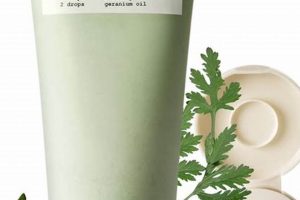Creatine is a naturally occurring compound found in muscle cells. It assists in producing energy during high-intensity exercise or heavy lifting. A common question arises regarding its suitability for individuals adhering to plant-based diets. The answer depends on the manufacturing process.
Supplementation with this compound enhances athletic performance, increases muscle mass, and improves strength. Its history dates back to the early 1900s, with widespread use in sports gaining momentum in the 1990s. The ergogenic effects are well-documented, providing benefits to various populations, including athletes and older adults.
The following sections delve into the production methods of this supplement, identifying which forms are suitable for vegan consumption. Furthermore, potential benefits and considerations for individuals on plant-based diets will be examined.
Guidance on Plant-Based Consumption
This section offers advice on selecting and utilizing creatine supplements in accordance with vegan principles.
Tip 1: Verify the Source. Scrutinize the label. The majority of supplemental creatine is synthesized, therefore vegan-compatible. However, verify that the manufacturer explicitly states this in the product description.
Tip 2: Look for Vegan Certification. Reputable brands may seek certification from organizations such as Vegan Action or The Vegan Society. This symbol provides assurance regarding the absence of animal-derived ingredients during production.
Tip 3: Inquire About Manufacturing Processes. If uncertainty persists regarding the supplement’s vegan status, contact the manufacturer directly. Clarification regarding the production and sourcing ensures alignment with dietary choices.
Tip 4: Monitor for Additives. Some creatine products may contain additives, fillers, or flavorings. Inspect the ingredient list for non-vegan components such as gelatin or lactose. Choose pure, unflavored creatine monohydrate to minimize risks.
Tip 5: Consult a Healthcare Professional. Individuals with pre-existing medical conditions or those taking medications should consult with a physician or registered dietitian before initiating creatine supplementation. Personalized guidance ensures safety and effectiveness.
Tip 6: Start with a Loading Phase (Optional). Some protocols recommend a loading phase to saturate muscle creatine stores rapidly. This typically involves consuming 20 grams per day for five to seven days, followed by a maintenance dose of 3-5 grams daily.
Tip 7: Maintain Adequate Hydration. Creatine draws water into muscle cells, increasing the need for adequate hydration. Drink plenty of water throughout the day, especially during periods of creatine supplementation.
Implementing these guidelines facilitates the informed selection and utilization of this compound, supporting fitness goals within the constraints of a plant-based lifestyle.
The next section will provide concluding remarks summarizing the information presented.
1. Synthetic production common
The prevalence of synthetic production methods for creatine is central to its accessibility within vegan diets. This production pathway bypasses the use of animal-derived ingredients, directly addressing dietary concerns.
- Production Methodology
The primary method for creating creatine involves chemical synthesis using sarcosine and cyanamide. This process is entirely synthetic, ensuring no animal products are utilized at any stage. The widespread adoption of this technique renders most creatine supplements inherently vegan-compliant.
- Cost-Effectiveness and Scalability
Synthetic production allows for cost-effective and scalable manufacturing. This affordability makes creatine accessible to a broader consumer base, including those following vegan lifestyles. The efficient nature of the process supports high-volume production, meeting market demand.
- Purity and Quality Control
Synthetic production enables stringent quality control measures. Manufacturers can regulate the purity of the final product, minimizing the risk of contamination. This controlled environment contributes to the consistency and reliability of creatine supplements, regardless of dietary preference.
- Elimination of Animal Byproducts
The most significant benefit of synthetic production is the complete absence of animal byproducts. This ensures that the final creatine product is suitable for vegans, removing ethical and dietary obstacles associated with animal-derived alternatives. The synthetic approach aligns with the core tenets of veganism.
The prevalence of synthetic creatine production directly addresses the primary concern regarding its vegan suitability. By avoiding animal inputs and ensuring consistent quality, this method facilitates the seamless integration of creatine into plant-based diets. This underscores its importance for vegans seeking ergogenic benefits.
2. No animal sources
The absence of animal-derived materials is a foundational element in establishing the compatibility of creatine with vegan dietary practices. Supplemental creatine, in its typical form, originates from synthetic manufacturing processes, effectively circumventing the utilization of animal tissues or byproducts. This attribute directly addresses the core principle of veganism, which seeks to exclude all forms of animal exploitation and cruelty.
The practical implication of creatine’s non-animal sourcing significantly widens its accessibility within the vegan community. Athletes and individuals adhering to plant-based diets can leverage the ergogenic benefits of creatine supplementation without compromising their ethical or dietary commitments. The reliance on synthetic production techniques ensures that concerns about animal welfare are alleviated, promoting confidence in the product’s alignment with vegan values. For instance, a vegan bodybuilder can utilize creatine to enhance muscle strength and growth, secure in the knowledge that the supplement does not involve animal exploitation.
In summary, the explicit avoidance of animal sources in the production of supplemental creatine is indispensable for its classification as a vegan-compatible product. This characteristic allows individuals following plant-based diets to benefit from its performance-enhancing properties without contravening their ethical principles. Further exploration of manufacturing transparency and third-party certifications serves to reinforce this assurance, ensuring the continued accessibility of creatine within the vegan community.
3. Ingredient verification crucial
Determining the vegan status of creatine necessitates rigorous examination of the product’s ingredient list. While creatine itself is often synthetically produced and thus vegan, extraneous components included in the formulation may negate its suitability for plant-based diets.
- Hidden Non-Vegan Additives
Many supplements contain additives, fillers, or coatings that are not explicitly listed as “non-vegan” but derive from animal sources. Gelatin capsules, magnesium stearate (which can be sourced from animal fats), and certain artificial colors are common examples. Thorough ingredient verification is essential to identify and avoid these concealed non-vegan elements.
- Flavorings and Sweeteners
Flavored creatine products often incorporate ingredients that may be questionable from a vegan perspective. Dairy-derived sweeteners such as lactose or whey, or natural flavorings sourced from animals, can compromise the product’s vegan status. Unflavored creatine monohydrate generally presents the safest option, minimizing the risk of unintended animal-derived ingredients.
- Cross-Contamination Concerns
Even if the listed ingredients appear vegan, cross-contamination during manufacturing can occur. Production facilities that handle both vegan and non-vegan products may expose creatine to trace amounts of animal-derived substances. Seeking products from manufacturers with dedicated vegan production lines or certifications reduces the likelihood of cross-contamination.
- Label Transparency and Accuracy
Ingredient verification relies on the accuracy and transparency of product labeling. Manufacturers are legally obligated to disclose all ingredients, but omissions or ambiguous labeling practices can impede the verification process. Comparing multiple brands and consulting reliable vegan ingredient databases can enhance the accuracy of assessment.
In conclusion, while creatine’s synthetic production generally aligns with vegan principles, the presence of hidden non-vegan additives, flavorings, or the risk of cross-contamination necessitates meticulous ingredient verification. Comprehensive assessment ensures that creatine supplementation remains consistent with plant-based dietary choices and ethical commitments.
4. Manufacturing processes matter
The determination of whether creatine is suitable for vegans is inextricably linked to its manufacturing processes. While the base compound itself is not inherently animal-derived, the methods employed during its production and the potential introduction of non-vegan additives are critical determinants. The manufacturing process, therefore, becomes a pivotal factor in establishing the vegan status of the final product.
The significance of scrutinizing manufacturing practices extends beyond the direct presence of animal-derived ingredients. Cross-contamination within a facility that processes both vegan and non-vegan products poses a potential risk. For example, creatine produced on shared equipment might come into contact with trace amounts of dairy or other animal byproducts, rendering it unsuitable for strict vegans. The adherence to Good Manufacturing Practices (GMP) and the implementation of rigorous cleaning protocols are vital in mitigating these risks. Vegan-certified creatine often undergoes independent audits of its manufacturing facilities, providing additional assurance against cross-contamination.
In conclusion, while synthesized creatine itself is vegan, the manufacturing processes wield considerable influence on the final product’s suitability for plant-based diets. Paying careful attention to these processes, seeking out certified vegan products, and engaging with manufacturers to understand their quality control measures are essential steps for vegans seeking to incorporate creatine into their regimens. This understanding ensures that the chosen supplement aligns with both ethical and dietary requirements.
5. Certification provides assurance
Third-party certification serves as a crucial mechanism for verifying the vegan status of creatine supplements. The presence of a recognized vegan certification mark on a product’s packaging indicates that an independent organization has assessed the manufacturing processes and ingredient sourcing to ensure compliance with established vegan standards. This certification provides consumers with a tangible means of confirming that the creatine supplement is free from animal-derived ingredients and has not been subjected to cross-contamination during production. The Vegan Society, Vegan Action, and Certified Vegan are examples of such certifying bodies.
The certification process typically involves a comprehensive review of the manufacturing facility, ingredient suppliers, and product formulations. Auditors examine the production line to identify potential sources of animal-derived materials and verify the implementation of cleaning protocols designed to prevent cross-contamination. Ingredient lists are meticulously scrutinized to confirm the absence of non-vegan additives, flavorings, or processing aids. Manufacturers seeking vegan certification must demonstrate a commitment to transparency and traceability, providing detailed information about their sourcing and production methods. For instance, a creatine product bearing the Vegan Action logo signifies that the manufacturer has undergone this rigorous evaluation and has met the organization’s strict criteria.
Vegan certification significantly reduces the burden on consumers to independently verify the vegan status of creatine supplements. It provides a level of assurance that would otherwise require extensive research and direct communication with manufacturers. This assurance is particularly valuable for individuals who adhere to strict vegan principles and seek to avoid any involvement in animal exploitation. The presence of a reputable certification mark streamlines the decision-making process and allows consumers to confidently select creatine supplements that align with their ethical values. The role of certification in verifying vegan claims represents a critical component in ensuring the integrity of the plant-based market.
6. Potential additives exist
The assertion “potential additives exist” directly influences the determination of whether a creatine supplement is vegan. Creatine, in its pure form, is typically synthetically produced and therefore does not inherently contain animal-derived substances. However, manufacturers often incorporate additional ingredients into creatine formulations for various purposes, such as enhancing flavor, improving solubility, or preventing clumping. These additives can include gelatin, used as a capsule material; magnesium stearate, potentially sourced from animal fats; or artificial flavors and sweeteners that may contain hidden non-vegan components. The existence of these potential additives necessitates a thorough examination of the product’s ingredient list to ascertain its true vegan status. A failure to account for potential additives can lead to the unintentional consumption of animal products, contravening vegan principles.
For example, creatine capsules are often preferred for their convenience, but the capsule itself might be made from gelatin, a protein derived from animal collagen. Similarly, flavored creatine powders frequently contain artificial sweeteners like lactose or whey, which are dairy derivatives. The practical significance of this understanding is that individuals adhering to vegan diets cannot rely solely on the fact that creatine itself is synthetically produced. Instead, they must meticulously scrutinize the complete ingredient list, seeking out products that explicitly state they are vegan or, ideally, are certified by a reputable vegan organization. Choosing unflavored, pure creatine monohydrate can minimize the risk of encountering non-vegan additives.
In conclusion, the potential presence of non-vegan additives significantly complicates the question of whether creatine is vegan. While the base creatine compound is generally compliant, additives introduced during manufacturing can render a product unsuitable for plant-based diets. Therefore, a comprehensive assessment of the ingredient list and a preference for certified vegan products are essential steps to ensure that creatine supplementation aligns with vegan ethical and dietary standards. The challenge lies in the variability of formulations across different brands, underscoring the need for constant vigilance and informed consumer choices. This understanding forms a critical component in ensuring the accessibility and integrity of vegan options within the supplement market.
7. Benefits for plant-based diets
Plant-based diets, while offering numerous health advantages, may present challenges in obtaining adequate levels of certain nutrients, including creatine. Creatine, primarily found in animal tissues, is often lower in individuals adhering to strict vegan or vegetarian diets. Consequently, supplementation becomes a relevant consideration, contingent on the understanding of whether available creatine products are vegan. This is where the query “is creatine vegan” becomes pertinent, framing the ability of those on plant-based diets to obtain the benefits of supplementation. Specifically, it can help improve muscle creatine stores, which in turn support enhanced athletic performance, increased muscle mass, and improved cognitive function. Therefore, addressing the question, “is creatine vegan” unlocks the potential for plant-based individuals to compensate for diet-related deficiencies effectively.
Creatine’s role extends beyond athletic performance. Cognitive benefits, such as improved memory and reduced mental fatigue, are becoming increasingly recognized. These effects are significant for plant-based individuals, as creatine supplementation can compensate for lower dietary intake, impacting both physical and mental well-being. For example, a vegan student may experience enhanced cognitive performance during demanding study periods through creatine supplementation, whereas a vegan athlete may find improved strength and power output during training. The ability to identify and utilize vegan-friendly creatine supplements opens opportunities to counteract potential dietary limitations inherent in plant-based regimens. Such opportunities depend on knowing, and addressing, if creatine is vegan.
The practical significance of recognizing the benefits of creatine supplementation for plant-based diets, combined with ascertaining that the supplement is vegan, lies in its ability to enhance the overall nutritional profile of these diets. Addressing the question “is creatine vegan” empowers individuals to make informed choices, mitigating potential deficiencies and optimizing both physical and cognitive function. Challenges may arise in ensuring the purity and vegan status of supplements due to potential cross-contamination or hidden non-vegan additives. This reinforces the importance of third-party certifications and diligent label reading. Understanding these interconnected elements ultimately supports the wider adoption and sustained adherence to well-rounded, health-promoting plant-based lifestyles.
Frequently Asked Questions
This section addresses common inquiries regarding the suitability of creatine for individuals adhering to vegan diets.
Question 1: Is all creatine inherently vegan?
While the fundamental creatine compound is typically produced synthetically, the presence of animal-derived additives or cross-contamination during manufacturing can compromise its vegan status. Therefore, it is inaccurate to assume all creatine is vegan.
Question 2: How can the vegan status of a creatine supplement be verified?
The most reliable method involves scrutinizing the product’s ingredient list for non-vegan components and seeking certifications from reputable vegan organizations. Contacting the manufacturer directly for clarification on sourcing and production processes can also provide valuable information.
Question 3: What types of additives should vegans avoid in creatine supplements?
Vegans should avoid creatine supplements containing gelatin (often used in capsules), magnesium stearate (which can be animal-derived), lactose or whey (dairy derivatives), and certain artificial colors or flavorings of uncertain origin. Opting for unflavored, pure creatine monohydrate reduces this risk.
Question 4: Does the manufacturing process influence the vegan status of creatine?
The manufacturing process plays a significant role. Even if the listed ingredients appear vegan, cross-contamination in facilities that handle both vegan and non-vegan products can render the creatine unsuitable. Seeking products from facilities with dedicated vegan production lines mitigates this risk.
Question 5: Are there specific creatine forms that are more likely to be vegan?
Creatine monohydrate, in its pure, unflavored form, is generally more likely to be vegan. Creatine ethyl ester and creatine hydrochloride may also be vegan, but careful ingredient verification is still essential.
Question 6: Can vegans obtain sufficient creatine from their diet alone?
Obtaining sufficient creatine from a strictly vegan diet is challenging, as creatine is primarily found in animal tissues. Supplementation can therefore be beneficial for vegans seeking to optimize muscle creatine stores and experience the associated performance and cognitive benefits.
In summary, while creatine itself is often synthetically produced and aligns with vegan principles, vigilance regarding additives and manufacturing processes remains essential. Seeking certified vegan products and engaging with manufacturers provides assurance.
The subsequent section offers concluding remarks summarizing the presented information.
Is Creatine Vegan
The inquiry “is creatine vegan” necessitates nuanced consideration. While synthetically produced creatine itself aligns with vegan principles, the presence of non-vegan additives and the potential for cross-contamination during manufacturing significantly influence its suitability. Diligent verification of ingredient lists, scrutiny of manufacturing processes, and prioritization of certified vegan products are essential for consumers adhering to plant-based diets.
Ultimately, determining whether a creatine supplement is vegan requires informed decision-making. Continued transparency from manufacturers, coupled with rigorous third-party certifications, will facilitate greater confidence among vegan consumers seeking to leverage the ergogenic benefits of creatine supplementation. This ensures that ethical dietary choices are respected and upheld within the supplement market.







